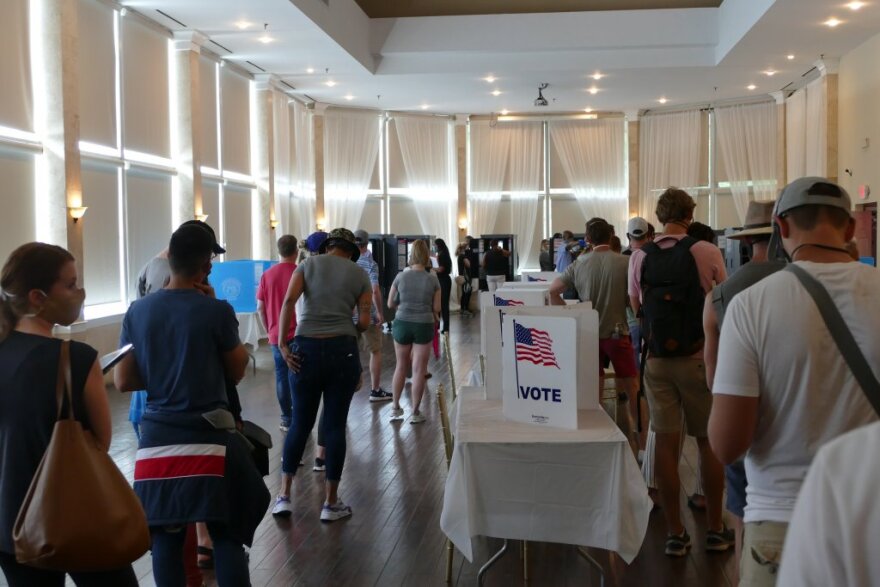Elections subcommittee chairman voiced concerns about recent voting requirement laws in states such as Georgia, Texas - From Idaho Capital Sun Ariana Figueroa reports
WASHINGTON — Members of a U.S. House panel on Monday debated whether some state elections laws disenfranchise certain voters, including people of color, and split along party lines in their conclusions.
The chairman of the elections subcommittee of the House Administration Committee, Rep. G. K. Butterfield (D-N.C.), voiced his concerns about recent voting requirement laws in states such as Georgia and Texas, as well as those that have been passed in his home state.
Butterfield said the effect of such laws is to make it much more difficult for some people to vote, including rural residents and minority groups.
Butterfield added that the Voting Rights Act of 1965 prevented states from enacting voting laws that could harm voters of color, and he said that Congress needs to reinstate such protections.
“The Texas and North Carolina voter ID laws illustrate the critical role that the Voting Rights Act played in protecting the rights of minority voters and exemplify the need for Congress, for us, to enact legislation to revitalize federal protection of minority voting rights,” he said.
Nazita Lajevard, an assistant professor of political science at Michigan State University, said her research has focused on how voter ID laws affect minority voters.
“Across the board, my colleagues and I have found that these laws impose a disproportionate burden on minority voters; our research consistently has found a negative and significant empirical link between voter identification laws and minority turnout in the United States,” she said in her opening statement.
Matthew Campbell, a staff attorney for the Native American Rights Fund in Boulder, Colorado, said that voter ID requirements also erect barriers to voting for Native Americans.
“Due to ongoing discrimination and governmental neglect, many Native Americans live in overcrowded homes that do not have addresses, do not receive mail, and are located on dirt roads that become impassable with inclement weather,” he said.
Campbell added that many tribal IDs are not automatically accepted as proper documentation for voter registration “despite how unreasonably difficult it is for American Indian and Alaska Natives to get a state ID.”
But the ranking member of the panel, Rep. Bryan Steil (R-Wis.), argued that most Americans need ID to purchase alcohol or to go through airport security. A driver’s license is not required to fly within the U.S. borders, but a traveler will have to go through additional identity and security screening at the TSA security checkpoint.
He asked one of the witnesses, Lori Roman, the president of the American Constitutional Rights Union in Florida, if voter ID laws had a discriminatory intent. The ACRU was founded as a conservative alternative to the American Civil Liberties Union and describes itself as focused on protecting constitutional civil rights and promoting election integrity.
“No, if applied to as you indicated,” she said, referring to how his state requires voter IDs and how identification is needed to purchase alcohol.
Steil said that Republicans “want to ensure that every eligible person who wants to vote is able to cast a vote.”
“The far left has been working overtime to mischaracterize new voting laws across the United States,” he said in his opening statement. “The left’s characterization of voter laws like the one recently passed in Georgia and other states have multiple ‘Pinocchios’ and ‘pants on fires’ when rated by fact checkers.”
PolitiFact, which doles out the “Pants on Fire” label for inaccurate claims, has not done a rating related to the new Georgia law. The Washington Post’s fact checker, which gives Pinocchios for false statements, gave one to President Joe Biden, who inaccurately said the new Georgia law ends voting hours early.
Butterfield, the chairman, said that the panel would continue to examine how voter ID laws affect communities of color as Democrats work to advance their elections and campaign finance reform package, H.R. 1.
That bill has passed the House and is now waiting for action in the Senate, where it’s not clear how Democrats will gain enough votes to send it to Biden’s desk.


